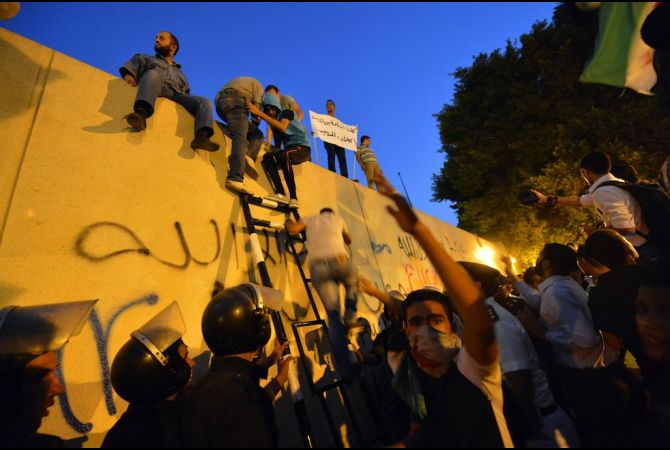Last week’s violence in more than 20 Muslim countries with four Americans killed in Libya has been attributed to a highly offensive 13-minute video that went viral on YouTube igniting these protests.
Unfortunately, the real causal factors of this violence run much deeper and could prove irreconcilable.
The late Samuel Huntington partially captured this divide as a “clash of civilizations.” In fact, this collision is a clash of cultures for which the United States has no preventative or even a basic plan for a countering narrative, in today’s jargon called strategic communications.
The heat of a presidential campaign has obscured objective and rational dissection of what actually caused these riots. Lost in the exchanges between the candidates in assigning and rejecting blame is any mention of the underlying forces that set Muslims against Americans or of the power of the cyber revolution that instantaneously connects millions of people.
Recall that the self-immolation of a Tunisian fruit vender precipitated what became known as the “Arab Spring” nearly two years ago alerting us to a phenomenon that would prove persistent, predictable, recurring and powerful.
Now suppose that the translation of this video into Arabic was done by al-Qaida or by groups out to do America harm or derail its interests in the region perhaps in retaliation for what is viewed by most Arabs as unconditional support for Israel.
This possibility reflects what the Pentagon describes as an “asymmetric” world meaning that in this struggle against extremism, our enemies and adversaries have abandoned Marquis of Queensbury rules. Osama bin Laden had no air force. So he turned four civilian airliners into missiles that killed more people than the Japanese attack on Pearl Harbor did seven decades ago.
Suicide bombers, improvised explosive devices and exploitation of social media are weapons of choice to offset the overwhelming strength and technology of the West.
The weekend attack on Camp Bastion in Afghanistan by Taliban wearing U.S. military uniforms to gain entry and destroying a half dozen jet fighters valued at $200 million in the process is another example.
And manufacturing inflammatory videos to enrage and engage Arab and Muslim publics is a clever and cunning use of asymmetries to attack and defame the enemy.
None of this is news. In 2004, the Pentagon’s Defense Science Board was tasked to study the state of this country’s strategic communications. It concluded and stated on the forwarding letter to the Secretary of Defense, the following: “The United States cannot win the war on terror if it does not win the war of ideas. And it is losing the war of ideas.”
What have we done since? The answer is very little.
We allowed Laden to issue religious edicts when he had absolutely no authority to do so. Similarly, Iran’s supreme leader has the equivalent of a high school theology degree.
Yet, who are the leaders of Islam who stand up to provide accurate representation of their religion or are encouraged to do so to condemn and counter that propaganda?
The U.S. State Department does have a small strategic communications office. But it is directed at converting and convincing relatively junior members of extremist groups such as the Taliban to come in from the cold. The president and secretary of state can make grand speeches such as in Cairo three years ago. Yet, a speech is neither action nor follow up.
Crafting a sound strategic communications plan and a powerful narrative to counter radicalism are vital. They aren’t sufficient alone and we cannot delude ourselves that a single solution to a complex problem will work. Western democratic values such as free speech and the role of women in society abut against countering, strongly held religious views.
Friends such as Saudi Arabia harbor ideologies not consistent with ours in the form of Wahabism. Taliban regularly shoot or stone women to death for adultery. And in Pakistan, an 11-year-old girl with Down syndrome who cannot read or write and probably has the mental capacity of an infant was sent to an adult prison for allegedly destroying a page in the Koran — a charge later found to be false. Yet, she was allowed to linger in jail.
Few in the West understand how these and other travesties are allowed to recur.
Sadly for the United States, having a strategic communications plan in this battle against violent extremism and injustice isn’t on the agendas of either presidential candidate.
Hence, when the next incident occurs, which it will, and riots against America or the West break out, we should reread and take seriously the Defense Science Board’s warning — “We are losing the war of ideas!”
Harlan Ullman is senior advisor at the Atlantic Council, and chairman of the Killowen Group that advises leaders of government and business. This article was syndicated by UPI.
Image: US%20Embassy_0.jpg
